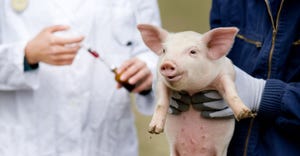Livestock and the House Farm Bill
During markup of the House bill, amendments were adopted regarding mandatory country-of -origin labeling (COOL) and the Grain Inspection, Packers and Stockyards Administration(GIPSA). Both issues were part of the 2008 farm bill. In addition, an amendment was adopted regarding state animal welfare standards.

During markup of the House bill, amendments were adopted regarding mandatory country-of-origin labeling (COOL) and the Grain Inspection, Packers and Stockyards Administration (GIPSA). Both issues were part of the 2008 farm bill. In addition, an amendment was adopted regarding state animal welfare standards. Key points in the bill include:
COOL – The bill requires USDA to report back to Congress within 90 days after the bill is signed by President Obama on how they would comply with the recent World Trade Organization.
GIPSA – The bill prevents GIPSA from doing any further work on the competition rule enacted in the 2008 farm bill. It prohibits USDA from advancing work on the proposed GIPSA rule or any new regulations or policy documents related to the onerous provisions included in the proposed rule. This would be issuing a final rule defining competitive injury and finalizing a rule on various poultry issues. The National Chicken Council says this amendment makes the GIPSA rule consistent with the legal intention of the 2008 farm bill by requiring GIPSA to rescind provisions about placing pullets, breeders and laying hens under the agency’s authority, defining a capital investment over the life of a growing arrangement, and requiring that a dealer provide 90 days notice before suspending delivery of a flock for more than 15 days. However, the Rural Advancement Foundation International-USA said many growers have a different view, “America’s poultry farmers deserve basic standards of fairness and access to information in their business dealings with poultry companies. Each of the hundreds of farmers who spoke up for these regulations during the rule-making process did so at risk of retaliation and the loss of their family’s livelihoods.”
State Animal Welfare Standards – The bill bars states from imposing animal welfare standards or other production rules that would apply to eggs, meat and other agricultural products that are part of interstate commerce.
About the Author(s)
You May Also Like



